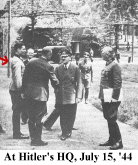Does the Church Condone Tyrannicide?
- FR. WILLIAM SAUNDERS
With the recent terrorist attacks, some have suggested that the leaders of these terrorist organizations be assassinated for the good of all people. What would be the Churchs teaching on this?
 |
The moral issue here is that of tyrannicide the killing of a tyrant, and specifically, the killing of a tyrant by a private person for the common good. Technically, there are two classes of tyrants: a tyrant by usurpation (tyrannus in titulo), a ruler who has illegitimately seized power; and a tyrant by oppression (tyrannus in regimine), a ruler who wields power unjustly, oppressively, and arbitrarily.
Tyrannicide has had support from various philosophers and theologians through the centuries, including the ancient Greeks and Romans, most notably Cicero; Catholics, most notably John of Salisbury (d. 1180) Jean Petit (d. 1411), and Suarez (d. 1617); and Protestants, most notably, Luther, Melanchthon, Zwingli, and Calvin.
St. Thomas Aquinas gave the most substantial argument for tyrannicide. He based his position on his arguments for just war and capital punishment. St. Thomas concluded, "He who kills a tyrant (i.e. an usurper) to free his country is praised and rewarded" (In 2 Sentences, 44.2.2).
A tyrant by usurpation has illegitimately seized power and, therefore, is a criminal. When there are no other means available of ridding the community of the tyrant, the community may kill him. According to St. Thomas, the legitimate authority may condemn him to death using the normal course of law. However, if the normal course of law is not available (due to the actions of the tyrant), then the legitimate authority can proceed "informally" to condemn the tyrant and even grant individuals a mandate to execute the tyrant. A private citizen who takes the life of a tyrant acts with public authority in the same way that a soldier does in war.
The key conditions for a justifiable act of tyrannicide in this case include that the killing be necessary to end the usurpation and restore legitimate authority; that there is no higher authority available that is able and willing to depose the usurper; and that there is no probability that the tyrannicide will result in even greater evil than allowing the usurper to remain in power.
A tyrant by oppression is one who has come to power legitimately, but rules unjustly, oppressively, and arbitrarily. Here the community must confront the tyrant, and if necessary, depose him, formally or informally, according to the course of law available. In most circumstances, a private citizen morally cannot kill a tyrant by oppression, because the tyrant came to power through a legitimate means and thereby the community must depose him. If the community does depose the tyrant, according to St. Thomas, he becomes now a tyrant by usurpation and thereby may be eliminated by an act of justifiable tyrannicide in accord with the above norms.
However, if the tyrant by oppression attacks the citizen, jeopardizes the welfare of the community with the intent leading it to destruction or killing the citizens, or commits other evils, then a private citizen can morally commit an act of justifiable tyrannicide. Moreover, if because of the tyrant's rule, a nation cannot defend itself, is on the course of destruction, and has no lawful means to depose or to condemn the tyrant, then a citizen may commit an act of justifiable tyrannicide. Interestingly, many modern political philosophers would posit that a leader who abuses power and has become tyrannical ipso facto loses legitimacy and becomes an usurper.
Please note that the Church has not definitively taught on this subject. The Church not only recognizes the authority of legitimate rulers and their duty to uphold the common good of the community, but also the duty of citizens to support a legitimate government. However, the Church also has set standards of just war and even capital punishment which would be applied to a conflict between a community against an unjust tyrannical leader. Keep in mind that an act of justifiable tyrannicide would have to be an act of last resort, when no other reasonable course of action is available to protect the community.
 |
|
Klaus
von Stauffenberg
|
Perhaps a particular example would help. In the Summer of 1944, many officers in the German military realized that their country would soon lose the war. The Allies had successfully landed in France with the D-Day Invasion and were pushing toward Germany; the Soviets were advancing from the East; the major cities of Germany were bombed heavily and frequently. To save Germany from devastating defeat and form a new government, Lieutenant Colonel Klaus von Stauffenberg, described as "a serious Catholic," formed a plot to assassinate Hitler on July 20. He and other members, including Field Marshal Rommel, Field Marshal von Witzleben, and General Beck, knew that Hitler had to be removed from power, and recognized that no regular means of government existed to do so. The only course of action seemed to be justifiable tyrannicide. Von Stauffenberg reportedly met with Cardinal Count Preysing of Berlin to discuss this matter, and his eminence honored the motives and offered no theological objection to restrain him. In so doing, Cardinal Preysing placed his own life in jeopardy with the Gestapo, but was never implicated in the plot.
On the evening of July 19, von Stauffenberg stopped by a Church to pray and then retired to bed. The next day, July 20, he planted the bomb at the Wolf's Lair at Rastenburg in East Prussia. It exploded, but failed to kill Hitler. Von Stauffenberg and three others were arrested and executed that very night; others would endure the same fate later. However, they committed, or at least tried to commit, an act of justifiable tyrannicide. (See Fitzgibbon, 20 July, p. 150, Shirer, The Rise and Fall of the Third Reich, p. 1042ff, Royal, The Catholic Martyrs of the Twentieth Century, p. 154.)
Again, the Church has not definitively taught on this moral issue. However, terrorism is a real evil that must be confronted and stopped. Terrorists must be identified, isolated, and brought to justice. However, if there are no means of bringing them to justice or there are communities who support, protect, and promote them, thereby thwarting the pursuit of justice, then the leaders of nations may consider an act of justifiable tyrannicide as a last resort.
 This is J. Fraser Field, Founder of CERC. I hope you appreciated this piece. We curate these articles especially for believers like you.
This is J. Fraser Field, Founder of CERC. I hope you appreciated this piece. We curate these articles especially for believers like you.
Please show your appreciation by making a $3 donation. CERC is entirely reader supported.

Acknowledgement
Saunders, Rev. William. "Does the Church Condone Tyrannicide?" Arlington Catholic Herald.
This article is reprinted with permission from Arlington Catholic Herald.
The Author

 Father William Saunders is pastor of Our Lady of Hope parish in Potomac Falls, Virginia. He is dean of the Notre Dame Graduate School of Christendom College. The above article is a "Straight Answers" column he wrote for the Arlington Catholic Herald. Father Saunders is the author of Straight Answers, a book based on 100 of his columns, and Straight Answers II.
Father William Saunders is pastor of Our Lady of Hope parish in Potomac Falls, Virginia. He is dean of the Notre Dame Graduate School of Christendom College. The above article is a "Straight Answers" column he wrote for the Arlington Catholic Herald. Father Saunders is the author of Straight Answers, a book based on 100 of his columns, and Straight Answers II.


